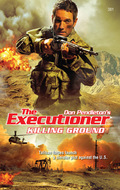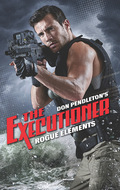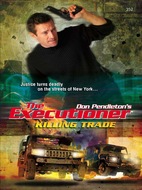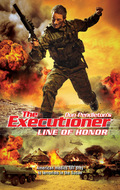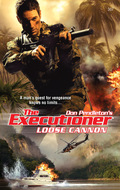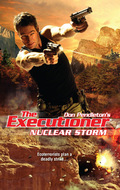Kitap dosya olarak indirilemez ancak uygulamamız üzerinden veya online olarak web sitemizden okunabilir.
Kitabı oku: «Lethal Diversion»
HIDE AND SEEK
Terrorists have hidden a massive bomb in Detroit, but the White House and local police have no idea when and where it’s going to go off. One thing is certain, thousands will die in the explosion unless Mack Bolan can intercept the device before time runs out.
As each lead results in more dead bodies but surprisingly little intel, Bolan is convinced that this is a well-planned venture and that he and the police are mere pawns in the mastermind’s scheme. But that’s about to change. Tired of being led on a wild-goose chase and with the clock counting down, the Executioner is shifting the rules of the game—the hunter is about to become the hunted.
The door crashed to the floor, landing on top of the screaming sentry
Bolan dived through the opening, firing the Desert Eagle as he moved. His comm unit was going crazy, with the FBI teams talking over each other. The four terrorists in the middle of the warehouse had armed themselves and were shooting wildly at the shadows around them.
Bolan ran for the only cover there was—a shadowed nook beneath the stairs leading to the catwalk. He took aim at the man closest to the bomb and dropped him with a well-placed round in the hip. The remaining terrorists didn’t know where to focus their fire, and all three ran in opposite directions.
An FBI agent came through the broken doorway where Bolan had entered, and swiftly put two rounds into the chest of the man running toward him. That left two men on the floor and one on the catwalk.
Bolan scanned the metal walkway above him and spotted his target trying to pry open the window. The Executioner stealthily moved up the stairs, even as he heard the other two assailants go down in a hail of gunfire at the back of the building.
In his earpiece, the lead FBI agent said, “Stand down, everyone.” Bolan ignored the command as he crept up behind the man frantically trying to escape through the too-small window. Bolan was just a few feet behind him when the man’s senses must have told him someone was there.
The terrorist whipped around, pulling a 9 mm from his waistband. The Executioner gunned him down without hesitation, the echoes from his shot loud in the relative silence of the warehouse. “Now everyone can stand down.”
Lethal Diversion
Don Pendleton

Special thanks and acknowledgment to Dylan Garrett for his contribution to this work.
’Tis now the very witching time of night,
When churchyards yawn and hell itself breathes out
Contagion to this world.
—William Shakespeare (1564–1616)
Hamlet
The devil isn’t hiding in some dark corner of the universe. He is right here on earth, burrowing into the hearts of evil men, thriving on their heinous acts. The devil is all too real—and I am his greatest threat.
—Mack Bolan
The Mack Bolan Legend
Nothing less than a war could have fashioned the destiny of the man called Mack Bolan. Bolan earned the Executioner title in the jungle hell of Vietnam.
But this soldier also wore another name—Sergeant Mercy. He was so tagged because of the compassion he showed to wounded comrades-in-arms and Vietnamese civilians.
Mack Bolan’s second tour of duty ended prematurely when he was given emergency leave to return home and bury his family, victims of the Mob. Then he declared a one-man war against the Mafia.
He confronted the Families head-on from coast to coast, and soon a hope of victory began to appear. But Bolan had broken society’s every rule. That same society started gunning for this elusive warrior—to no avail.
So Bolan was offered amnesty to work within the system against terrorism. This time, as an employee of Uncle Sam, Bolan became Colonel John Phoenix. With a com-mand center at Stony Man Farm in Virginia, he and his new allies—Able Team and Phoenix Force—waged
relentless war on a new adversary: the KGB.
But when his one true love, April Rose, died at the hands of the Soviet terror machine, Bolan severed all ties with
Establishment authority.
Now, after a lengthy lone-wolf struggle and much soul-searching, the Executioner has agreed to enter an “arm’s-length” alliance with his government once more, reserving the right to pursue personal missions in his Everlasting War.
Contents
QUOTATION
PROLOGUE
CHAPTER 1
CHAPTER 2
CHAPTER 3
CHAPTER 4
CHAPTER 5
CHAPTER 6
CHAPTER 7
CHAPTER 8
CHAPTER 9
CHAPTER 10
CHAPTER 11
CHAPTER 12
CHAPTER 13
CHAPTER 14
CHAPTER 15
CHAPTER 16
CHAPTER 17
CHAPTER 18
CHAPTER 19
CHAPTER 20
CHAPTER 21
CHAPTER 22
EPILOGUE
“’Tis now the very witching time of night,
When churchyards yawn and hell itself breathes out
Contagion to this world.”
—William Shakespeare
“’Tis the night—the night
Of the grave’s delight,
And the warlocks are at their play;
Ye think that without
The wild winds shout,
But no, it is they—it is they.”
—Arthur Cleveland Coxe
“From ghoulies and ghosties
And long-leggedy beasties
And things that go bump in the night,
Good Lord, deliver us!”
—Scottish saying
PROLOGUE
The customized fifty-foot yacht sat low in the water of Lake St. Clair, rocking back and forth with the regularity of the low-tide waves. The full moon overhead lit up the craft and the smaller vessel attached to its side, floating together several miles offshore from Grosse Point Park, Michigan, in the border waters between Canada and the United States. A dispute here might be adjudicated by one country or even both, depending on who claimed jurisdiction and had the precise GPS coordinates to make such a claim. Malick Yasim expected that the location itself might add a certain tangle to the web that was being woven around the city of Detroit.
He skillfully climbed the rope ladder onto the sailboat, taking the lead ahead of his men. Stepping onto the deck, he flinched as a floodlight blinded him momentarily. “Assalamu alaikum,” he said, “now shut that damn thing off! It’s bright enough to be seen from shore.” His Afghani accent was barely noticeable.
The light went out, and was followed by a familiar voice. “Wa alaikum assalaam. I see that Sayid sent the Mummy himself to take delivery.”
Yasim scowled at the nickname. Some called him that because they were certain his body count rivaled that of the mummies in Egypt, but Yusef liked to use it because at six foot two and bald as an egg, Malick’s resemblance to the character in the movie was almost uncanny. There was little that he could do to dissuade the usage, but after this night he suspected others would make reference to it only in regard to his body count.
He waited for his eyes to adjust and for the three men he’d brought with him to come up the ladder. “Have you traveled all this way to mock me, or did you bring the merchandise Sayid requested? We have no time for foolishness.”
Yusef stepped forward and shook Yasim’s hand, kissing him on either cheek. “Do not be so temperamental, my brother. I have succeeded as promised. Come and see.” In spite of the bulk he carried around his waist, the short man pivoted on his heels gracefully and headed below deck. Yasim followed close behind, watching the tassels on the man’s red felt tarboosh swing to and fro.
The loss of the night air and the horizon line combined with the rocking of the boat caused Yasim’s stomach to roll. It was the primary reason he hadn’t been chosen to retrieve this merchandise from halfway around the world. He’d have never made it that long on board a ship and Sayid Rais Sayf believed that getting the uranium into the country was best accomplished by sea through Canada and into the United States.
To the naked eye, the main cabin of the yacht was nothing more remarkable than a well-furnished pleasure vessel, capable of long journeys. A kitchen, a galley, a table and benches that formed a U-shape in the corner. A short passage led to the sleeping quarters and a lavatory. Yusef walked to the table, unlocked the pins from underneath and revealed that it was actually a wooden top sitting on a large metal crate.
The container itself glowed faintly from the light of an electronic keypad on one side. Yasim moved forward, watching carefully as Yusef punched in a combination. The electronic locks popped open and he lifted the lid to reveal the long, slender rods of enriched uranium that he’d purchased for them in Iran. The box itself was refrigerated for safety, and the mist from inside floated around, giving an ethereal appearance to the deadly substance.
“You see, my friend? Everything is as I said it would be. There is nothing to cause you alarm.” Yusef closed the container and punched in the code to lock down the lid.
“And the code?”
“Ah, the only six numbers I knew we would all remember. The years of our prophet’s birth and death: five-seven-zero-six-three-two. Simple enough, yes?”
Trying to ignore the faint roiling in his guts, Yasim nodded. “Simple enough.”
“Then, as I can see that you are already—what is the saying?—green around the gills, let us return to deck and finish our transaction. I am certain that Sayid must be anxious to have you safely back in port.” He lowered the tabletop and replaced the pins. “Shall we?”
“There is one other matter that I must discuss with you first,” Yasim said. “Privately.”
“What is that?” Yusef asked, his eyes going a little white around the edges.
“While we were waiting for you to deliver the merchandise, word reached us that you spoke to the Libyans about selling them these rods instead of us.”
Yusef sputtered, his face turning red before he finally answered. “I... Astaghfirullah! I will not insult you by lying, Malick, and I am truly sorry, but I am a businessman and I thought I might make a greater profit by selling the rods to one of my contacts in Libya.”
Moving like a striking snake, Yasim whipped a thin-bladed knife from his belt, grabbed Yusef by the collar and forced him back against the bench. “It was our men who sacrificed to get you this cargo. Our blood that was spilled. Our money that was spent.” He spat on the ground. “Subhan’Allah! If you were truly a believer you would not be seeking profit. You would give us the rods willingly, for our holy cause.”
“Malick...you are right, I will ask for no profit. I will give this happily for the cause.”
“You have no cause but yourself. Did you tell anyone else where you were delivering the rods? Or perhaps you told the rival who they were bidding against?”
“No! No, I swear. I only explored the option, but I knew that this is where Allah wanted the shipment to go.”
“You should have known that all along.” Yasim’s blade sank into Yusef’s throat, puncturing his larynx. The man thrashed and struggled beneath Yasim’s grip briefly, but only briefly. He slumped to the floor and Malick offered a grim smile to the body. That would be the end of Yusef’s whining and groveling. He was in Hell where he belonged, his passage to Heaven denied by his own traitorous actions.
He wiped his blade clean, then climbed back up on deck. The two crew members who served Yusef were dead on the deck. He nodded in satisfaction to his team. “Let us finish this work and get back on land. My stomach does not tolerate this well. If I never step foot on a boat again it will be too soon.”
One of the men muttered a short prayer under his breath as they moved to unload the heavy crate from the yacht. Yasim prayed, too. He prayed that Allah would be with them as Sayid’s plan was put in motion and that thousands of Americans would die because of his efforts.
This was their jihad, their struggle. Justice would be visited upon them for all the wrongs done to their people by the Americans.
1
Denny Seles, the Special Agent in Charge of the Detroit Field Office of the Federal Bureau of Investigation sat in his black SUV for a moment, watching the scene. He was pushing forty, and while he’d long since gotten used to the middle-of-the-night phone calls that were part of his job, they didn’t usually come from the Coast Guard. More often than not, it was one of his field agents calling about a body. The flashing lights of an ambulance, along with two police cars, a fire truck and two other unmarked vehicles lit up the night. He flicked the Detroit Lions air freshener hanging from his rearview mirror, a superstitious habit he’d picked up along the way, and stepped out of the SUV.
Faintly, over the sound of voices and vehicles, he could hear the lapping of the waves of Lake St. Clair. He guessed that the large, white yacht grounded on the beach was the source of the call he’d received less than half an hour before.
“You must be Special Agent Seles?” a man said, stepping out of the crowd and extending a hand.
At six foot one, Denny wasn’t considered small, but the man standing before him had him by a good three inches. He was tall and lanky, but offered a tired smile.
“Yeah, that’s me,” he said. “Special Agent in Charge, Denny Seles.”
“Chief Richard Cline, sir,” he said, and they shook hands. “When the local guys told me your office had jurisdiction, your name and number were what they gave us. So you’ll be taking over this mess?”
“If the local guys are right about jurisdiction, then yeah. Tell me what you got.”
“A local fisherman called us in with a report of a boat run aground. We dispatched both a boat and a ground crew to the coordinates. Our ground crew got to the vessel first and backed out to wait for law enforcement as soon as they’d verified that everyone aboard was dead.”
“You logged the caller’s information?” Seles asked.
Cline nodded. “It will be in my written report, which will be on your desk by 0800.”
“Good,” Seles said. “Tell me what your ground crew found inside the boat.”
“You’ve got three dead—two with bullet wounds to the head, one with a knife wound to the throat. But I think the important information, sir, is that this isn’t an ordinary yacht.”
His tone caught Seles’s attention. “What do you mean?”
“I mean this isn’t a lake cruiser. This ship has been modified to sail the high seas, complete with an extendable mast system and sails. She came from deeper waters than Lake St. Clair.”
“A lot of ships in the Great Lakes are modified or even built to sail on the ocean. How do you know this one actually came from somewhere else?” the agent asked.
Cline chuckled. “I’m not guessing, sir. We ran the numbers on the hull. This boat was logged in the Mediterranean Sea three months ago and docked in Gibraltar around that time. All the permits for a non-commercial ocean crossing were found aboard.”
“Interesting,” he said. “You know anything else?”
“One last thing, sir. Beneath the table in the galley was a hidden, refrigerated compartment. It was empty, and when the local guys gave me the go-ahead on federal jurisdiction, I went ahead and ordered our forensic team to come in and do a full sweep.”
“You suspect something more than drug-smuggling?” Seles asked. “Out here?”
“A refrigerated metal compartment, sir? For drugs?” The chief shook his head. “It doesn’t add up.”
Seles nodded, appreciating the man’s professionalism. He hadn’t dealt with the Coast Guard much, but every time he had, they’d been genuine pros. “Okay. Thanks, Chief. I think I’ll go have a look-see.”
The large yacht had come aground among the jagged rocks of the coast near Grosse Point, and it was canted awkwardly to one side. He was a bit skeptical about climbing up, but his hesitation was overcome as Chief Cline moved easily onto the sloped deck. Seles mimicked his steps and was soon on the slanting deck himself.
Two bodies were pressed against the rail and the polished wood was streaked with blood. The shots had been up close and personal, as the powder burns on their clothing were easily visible in the bright light being supplied to the scene by the Coast Guard. Staring at them, Seles could feel his stomach tightening. All of the anti-profiling training in the world didn’t change his gut reaction after he’d spent two tours fighting in the Persian Gulf.
“I made sure our men didn’t move the bodies,” Cline was saying. “And we haven’t let anyone else do much with the scene. Pissed the coroner off to no end that the locals were called, but I don’t answer to county folks and I wasn’t about to let them contaminate the scene. God knows how much damage our guys already did by accident.”
“That’s good work, Chief. Where’s the third?”
“Down below deck,” he said. “Follow me.”
Seles’s shoes slipped as they worked their way below deck. He made his way down the steps and came up short as the container hidden beneath the galley table came into view. The heavy metal top lay open and the cooling lining looked like something out of a science-fiction movie. Denny immediately agreed with the chief’s assessment and walked carefully into the room.
“How long before that team of yours gets here?”
“They’re here now, sir,” Cline said. “Shall I have them come aboard?”
“Do it,” Seles said, then waited as Cline used his handheld radio to call them up.
A couple of minutes later, two men in hazmat suits walked on board, each carrying different types of detectors. The first team member who made his way into the cabin struggled with the lack of maneuverability of the suit in the confined space, and waved the second man back to the deck. Then he turned and stared at them wide-eyed. “What are your men doing in here without protective gear?”
“Hang on,” Cline said, “before you get hazmat-crazy. We brought you in to look at this container to see if you could get any tracings off it. We weren’t really expecting some major decontamination scene.”
The man’s eyes moved to the open container and then up to Cline’s. “Your call, Chief,” he said. Stepping forward, he ran his detector along the inside of the box, then pulled back and took off his helmet.
“It’s your scene, Chief, but are you in charge of this mess?” he asked.
Cline shook his head and jabbed a thumb in Seles’s direction. “That’s your man,” he said. “Special Agent Denny Seles, FBI.”
“Makes sense.” The man grunted. “Can I talk to you privately, sir?”
Seles could see the chief becoming flustered and getting ready to protest.
“What’s your name?” the agent asked.
“Mike Kaminski, Petty Officer, First Class,” he said.
“Okay, listen, Petty Officer. We’ve all been doing this a long time and your chief here was the one who had the foresight to get you guys en route before I even got here. Why the secrecy?”
The man straightened his spine. “No disrespect intended to the chief, sir. What he doesn’t know, he can’t talk about.”
“Let’s just have it,” Seles said. “I’ve got my suspicions, but I want confirmation and that’s where you come in.”
“All right,” Kaminski said. “That’s a lead-shielded, refrigerated container. Very recently, it held uranium.”
“Can you tell what kind?” Seles asked.
“Weapons-grade variety,” he said. “And from the looks of the container, I’d say you’re dealing with a substantial amount.”
“Give me an estimate,” Seles said.
“Easily twenty-five kilograms or more would fit inside that container, especially in rod or brick form.”
Seles sighed and nodded. “Okay, gentlemen. No one outside this room talks about this or gets this information until I say so. Understood?”
Both men nodded at once. “Chief Cline, I want your ground team to set up a hard perimeter, and no one—that includes local law enforcement—gets through. Tell them...” He paused as he considered and discarded several stories, then settled on one. “Tell them there’s a minor chemical spill of some kind in here and until we get it cleaned up, no one’s allowed aboard.”
“We can handle that,” Cline said.
“Good,” Seles replied. “I’m going to have some teams in here shortly and they’ll go over this boat, the bodies, everything, with a fine-toothed comb. No one touches anything else.”
“We got it,” Cline said.
“I’ll be back in a few,” Seles said, “but I’ve got to go make some calls.” He worked his way back out to the deck, down to the rocks, and from there to his SUV. Once he was inside, he pulled a number up on his list and almost laughed. He’d never thought to call it in a million years. He dialed, waited and a moment later a woman’s voice answered.
“Office of the Director,” she said. “This is Melinda Harris speaking.”
“This is Special Agent in Charge Denny Seles, Detroit,” he said. “I need to speak to Director Wallace, please.”
“He’s in a meeting, sir,” she said. “I can have him call you.”
“Interrupt him,” he said.
“Sir, he’s in an important meeting and—”
“Miss, this is a national-security issue. Put me through right now.”
She paused for a moment, then said, “Hold please.”
Seles waited on the line for Wallace’s voice, which he knew from phone conversations and the rare meeting in person.
“Seles, what the hell could be happening in Detroit that is so important that you pull me out of a meeting with the...never mind. What’s so pressing?”
“I’ve got a national security matter,” he said. “It’s serious.”
“In Detroit?” Wallace asked, sounding incredulous. “What the hell’s going on?”
“Someone, somewhere near here, has weapons-grade uranium. We just found the boat they used to bring it in.”
Wallace was quiet for a moment, then Seles clearly heard him say, “Melinda, clear my schedule and get me the White House on the other line.”
* * *
HAL BROGNOLA SAT in his hot tub simultaneously trying to position his kinked back in front of the jets and keep his cigar stub out of the water. He never smoked cigars, but he enjoyed chewing on them, and his taste in them was far too expensive to lose one in the water. As the Project Director for Stony Man Farm he could arrange for strike teams, clear up a terror threat and avert international disasters, but the day-in, day-out tension would make any man long for a massage. He’d have to settle for hot-water pressure jets, and as he relaxed, it began to work its magic on his sore muscles. He closed his eyes, sighing in relief.
He dismissed the first ring of his cell phone as a dream. It had to be. The second ring, however, reminded him that wanting something to be a dream often clashed with reality. Only a handful of people in the world had his number. He pushed himself out of the hot tub and reached for his phone, noting that the call was from a secure, blocked line.
“Hal Brognola,” he said.
“Hal, this is the President.”
Brognola felt his tension return with a sudden vengeance. “Mr. President, sir.”
“Hal, there’s a situation in Detroit,” the President said. “It could be very serious.”
“Go ahead, sir,” Brognola said.
“The Coast Guard found a boat run aground in Lake St. Clair. Three dead men and a container that had recently housed uranium. Hal...we have weapons-grade radioactive material on U.S. soil.”
“How can we help, Mr. President?”
“All the usual organizations are already doing their song and dance. They’ve activated the Detroit Emergency Operations Center and all the field agencies are coordinating through them.”
“That sounds right,” Brognola said. “Do you foresee a problem of some kind, sir?”
“I wish we had foreseen any of this. That’s the problem.”
“We can only react to what’s in front of us, Mr. President.”
“All right, Hal, here’s the deal. All our normal agencies are going to be up to their eyeballs in protocol and their little fiefdoms and covering their own asses. I’ve already had the Directors of the NSA and the FBI in here, shouting at each other about whose fault it was. In the meantime, before they get it all together, these terrorists could blow up Detroit. I want you to send someone in to cut through all the red-tape bullshit. If he runs into any snags with the locals, tell him to have them authorize through the Office of the President. I want this found and handled.”
Brognola knew that sometimes fate put the right man in the right place at just the right time. “As it happens, Mr. President, I have a man in the area already who will be perfect for the job.”
“Then get him working, Hal. We don’t know what we’re up against or how long we’ve got until these bastards do whatever it is they plan to do.”
“I’ll contact him immediately, Mr. President,” Brognola said, hanging up with a polite goodbye.
The man for the job was Mack Bolan. And if there was anyone who could hunt down and stop bad guys, it was Striker. The man sometimes called the Executioner.
Ücretsiz ön izlemeyi tamamladınız.

